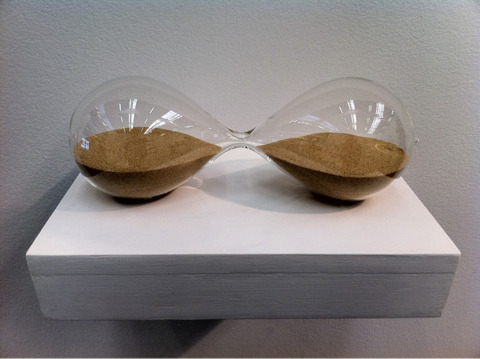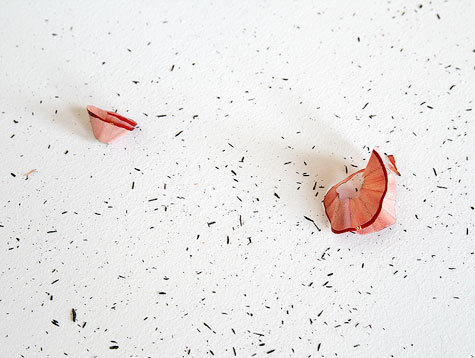Taysir Batniji: Suspended Time, 2006 Untitled (2007): Glass copy of the keys the artist used in Gaza
Taysir Batniji:Suspended Time, 2006Untitled (2007): Glass copy of the keys the artist used in Gaza before his departure in june 2006.Hannoun (1972-2009)Everyone has the right to freedom of movement and residence within the borders of each state. Everyone has the right to leave any country, including his own, and to return to his country.Article 13, Universal Declaration of Human Rights (1948)Suspended Time (2006): A far cry from the exploitative imagery used by the media, Taysir Batniji puts forward an interpretation distanced from events that mark out the situation in his country of origin, events which have prevented his return to Gaza since June 2006. Continuing the theme of a series of works produced by the artist since that historic date, Suspended Time is witness to a suspended reality, symbolized here by an hourglass placed on it side, which prevents the grains of sand from flowing freely. From this constrained condition which is a part of everyday life for the Palestinians, and takes account of the complexity of such a restrictive existence upon the individual, Taysir Batniji has developed a work in dialogue with a socio-political theme determined by a relationship conditional to space and time.[…] Untitled (2007) shows a glass copy of the bunch of keys used by the artist before his departure from Gaza, a fragile trophy from a past existence to which he can never return. Echoing the collective dispossession of land in 1948, since which date the Palestinians have preserved the keys of their houses in the hope of one day returning, Untitled (1997) also expresses the difficulty of a life of enforced itinerancy, here evoked by the imprints of rusty keys on rolled canvases. -Vérane Pina Translated by Theodora TaylorThe Hannoun project (poppy in Palestinian dialect) is based on scattering red pencil shavings on the ground. The red shavings suggest the appearance of a field of poppies: an impalpable landscape that one observes as in a dream from an un-crossable vantage point.This piece follows several performative projects, undertaken in the last few years that evoke notions of memory, erasure, non-being, and destruction/construction or (deconstruction /restitution). Each of these “acted shapes” is the result of obsessional, repetitive, and often useless or absurd gestures.In Palestinian consciousness and literature, the poppy has often been associated with the memory of freedom fighters. Despite this obvious symbolism,and especially through the repetitive act of pencil sharpening, Hannoun relates to a childhood memory. At school, to make sure we learnt our lessons we had to copy them by hand with a pencil, many times, especially during the holidays. Unconsciously trying to escape this exercise, I would spend my time sharpening pencils, under the pretext that they were never sharp enough. Invariably, I would skip my homework.Hannoun was thought – beyond any political or geographical concern – as an ideal space, a space of meditation, of dream, an intimate sphere, light, fragile yet imposing at the same time…an impenetrable space…inaccessible…mirroring my Atelier (22.06.2006-07.06.2009) in Gaza. Barely had the construction of my atelier in Gaza been completed in 2001, I had to leave again. Each year, when I return home (which is no longer possible since the borders were closed by the Israelis in 2006), I open my studio, abandoned ever since, go over my things and clear the dust on the ground. By then, it would be time to leave again, and the atelier is closed once more. Gaza has become a real yet unreachable place of production. Paris, or elsewhere, offers the possibility of production without the physical space to realize it. Just as an atelier is a space in which to elaborate, construct and work, Hannoun is “the attempt of an oeuvre” where what we perceive is not so much a finished product but rather the traces of its possible realization.- Taysir Batniji, co-written with Sophie Jaulmes, Translated by Carole Corm. -- source link
Tumblr Blog : 5centsapound.tumblr.com
#taysir batniji#palestine#palestinian artist






